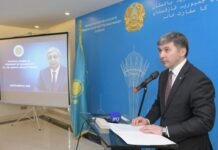New York, 9 December 2021 (TDI): Today is International Anti-Corruption Day. Governments, private companies, non-governmental organizations, the media, and citizens around the world are joining forces to fight this crime.
Corruption is a complex social, political, and economic phenomenon that affects all countries. It undermines democratic institutions, hinders economic development, and tends to undermine the very foundations of democracy by distorting electoral processes. It distorts the rule of law and creates tensions that are the only reason for the demand for bribes.
Economic development stagnates because foreign direct investment is not encouraged and small businesses in the country often find it impossible to overcome the “start-up costs” required due to corruption. On October 31, 2003, the General Assembly adopted the United Nations Convention against Corruption. It requested that the Secretary-General appoint the Office of the United Nations Drugs and Crime (UNODC) as a secretariat of the Convention’s Conference of state parties.
The Council also designated December 9 as World Anti-Corruption Day. The purpose of it is to raise awareness of corruption and the role of the Convention in the fight against and prevent it. The conference went into effect in December 2005.
The United Nations Development Program (UNDP) and the United Nations Office on Drugs and Crime (UNODC) are at the forefront of these efforts. Long speeches were made, and vows were made to end this vicious practice.
OECD Anti-Bribery Convention
The Organization for Economic Co-operation and Development (OECD) Anti-Bribery Convention establishes legally binding standards to criminalize bribery of foreign officials in international trade and provides several related measures to make this a success. It is the first and only international anti-corruption tool focused on the “Supply-side” of bribery transactions.
The 2021 recommendation on combating bribery of foreign public officials in the International Trade Agreement is in line with the Anti-Bribery Agreement to further strengthen and support its implementation.
Moreover, the (OECD) working group on bribery, comprises 44 countries that are members of the Anti-Bribery Convention. They are responsible for overseeing the implementation and enforcement of the Anti-Bribery conventions and recommendations.
In 2018, the Working Group decided to undertake a comprehensive review of 2009 Anti-Bribery recommendation. This was to ensure that we continue to reflect a range of best practices, styles, and challenges that have emerged in the international bribery sector over the past decade.
After a rigorous process, which included two rounds of extensive consultations with external partners, a ten-year stock accounting for the implementation of the 2009 Anti-Bribery Recommendation, several written procedures, and eight volunteer Working Group meetings, the 2021 Anti-Bribery Recommendation was adopted by the OECD Council on 26 November 2021.
With Recommendation, the Parties to the Anti-Bribery Agreement agree to new measures to strengthen their efforts to prevent, detect and investigate bribery in other countries. In addition to enhancing the provisions already included in the 2009 Anti-Bribery Recommendation.
The Recommendation 2021 covers sections on key issues that have emerged or significantly evolved in the anti-corruption environment. Including strengthening the enforcement of foreign bribery laws. Addressing the demand side of foreign bribery, strengthening international cooperation.
The introduction of non-bribery decision-making mechanisms, incentivizing anti-corruption compliance by companies, and the provision of complete and effective protection to reporting persons.
Right to benefit from strong anti-corruption efforts
It is one of five OECD Recommendations that form a strong OECD framework for fighting corruption, which includes areas such as taxation, legal development assistance, export debt, and state-owned enterprises.
While it is everyone’s right to benefit from strong anti-corruption efforts. Misconduct and wrongdoing are stealing away valuable resources at a time when they are most needed to respond and recover from the COVID pandemic.
And yet it is not only the countries that need to come together and address this global problem with shared responsibility. Every single person young or old has a role to play in preventing and combating corruption, promoting sustainability and integrity at all levels of society.
Accomplished and intelligent Economist with a significant amount of expertise in International Trade & Finance








